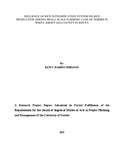Influence of rice intensification system on rice production among small scale farmers. Case of Tebere in Mwea, Kirinyaga county in Kenya
Abstract
Rice consumption has been increasing more rapidly than production over the years thus
increasing rice imports/consumption ratio by about 6% over the years with Thailand accounting
for 74% of all imports. The gap will continue to increase with increased population. There is
therefore an urgent need for improved rice practices that will ensure rice sufficiency and
security. This study investigated the influence of rice intensification system developed in the
early 1980’s in Madagascar by Father Henri de Laulaníe on rice production among the small
scale rice farmers of Tebere in Mwea Constituency, Kirinyaga County. It involves applying
certain identified agronomic management practices which allow better growing conditions for
rice plants, particularly in the root zone than those for plants grown under traditional practices.
The main objective of the study was to establish the rice management practices among the
farmers and how they influence rice production. The study used descriptive research survey
where data was collected through self administered questionnaires with open ended and closed questions. Two stage cluster random sampling was used to identify the respondents drawn from a sample size of 368 as determined by Krejcie and Morgan table. The data collected was analyzed using Statistical Package for Social Science (SPSS). The response rate was 96.2% with 65.5% male and 34.5% female representation. Most of the respondents used SRI practices though some mixed the SRI practices with the conventional practices. Majority of the respondents, 84.7% were partial SRI adopters while the rest had either abandoned it or had never adopted it. The study found positive perception of SRI among the respondents. From the cross check done, 52.3% of the respondents indicated having much higher rice yield after SRI and 97.5% of the respondents were satisfied with SRI. The study concluded that rice management practices, farmers’ awareness on system of rice intensification, adoption of system of rice intensification and farmers’ perception of system of rice intensification to a great extent influence rice production. The study recommended there be good management of Mwea Multipurpose rice growers and National Irrigation board to ensure good service delivery to the farmers. Additionally, the study suggested further research on: new methods of controlling birds in rice fields; proper land leveling techniques for rice cultivation and ways of facilitating farmers’ access to cheap farm inputs like machinery to improve rice produce.
Publisher
University of Nairobi

